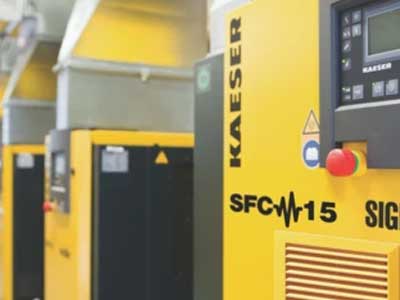- Industrial Supplies
- Coating & Finishing Systems
- Compressed Air Systems
- Assembly Tools
- Industries Served
- Aerospace & Defense
- Automotive & Specialty Vehicles
- Cannabis
- Construction & General Contracting
- Countertop Fabrication & Installation
- Food Processing
- Healthcare & Medical
- Logistics & Distribution
- Manufactured Building & Housing
- Manufacturing
- Metal Fabrication & Steel Works
- Millwork, Cabinetry, & Woodwork
- Packaging
- Pallets & Containers
- Plastics
- School Systems & Universities
- Signage
- Signs & Displays
- Textiles & Nonwovens
- Window & Door Installation
Everything you need to know about leak audits
If your compressed air system has an air leak, that could cost a fortune in wasted energy and air. This is not hyperbole, and it’s not an exaggeration.
Manufacturing facilities spend a massive portion of their total energy costs on compressed air alone. Estimating exact costs is difficult (taking into account factors such as system size, compressor power and storage, leak size, and the cost of electricity in your area), but Fluid Power Journal Supply has published data estimating the annual cost of a quarter-inch leak to be around $18,000—a half-inch leak can cost large facilities around $74,174 a year!
Regardless of the total, one fact remains: air leaks are a waste of energy, money, and vital resources. Large or small, routine leak audits are critical to your system’s overall performance and affordability.
What are leak audits?
An audit of your compressed air system is the first step to determining your system’s needs. An audit will find problems that are causing your profits (quite literally) to seep into thin air.
Leak audits can be completed in a variety of ways. In many cases, a professional can simply conduct a walk-through evaluation of the system and identify clear issues that are wasting compressed air. A walk-through, however, is not enough to identify all the small cracks and gaps that could be causing inefficiencies.

A more thorough assessment of the air-compression system is often required and may include a review of key dynamics, such as pressure drops when the system is not operating. (Hint: if the pressure is dropping and the compressor runs continually during off hours, you likely have leaks!)
Professionals can also complete a full leak audit, which includes reviewing energy usage, analyzing air measurements, implementing leak-detection measures, and performing a maintenance review.
When complete, an air-compression professional will identify key factors that are harming your system and causing air leaks. Depending on audit findings, a system technician may recommend repairing or replacing worn parts or mismatched fittings and, in some cases, installing a new compressor when appropriate.
Why are leak audits important?
Leak audits are important for many reasons — but most importantly, they save money. Leak audits help identify and fix issues and, once upgrades are complete, reduce the total demand placed on a compressor. The compressor does not need to run as often, significantly reducing your energy bill.
When a compressor runs more than it should, it wears down faster than it would’ve otherwise. Leak audits can streamline your overall system maintenance and even reduce the need for new equipment. That’s some savings; new compressors, especially advanced industrial units, can cost tens of thousands of dollars. A leak audit, followed by appropriate repairs and maintenance, can extend the life of these expensive compressed-air machines.
Get reliable experts to help with your leak audit
If you’re looking to save money on energy or conduct air leaks because you suspect issues, turn to Elevated! We’re an authorized Kaeser distributor in South Carolina, Dayton, and Cincinnati. And we’re known for our compressed air services, such as preventive maintenance and audits. Our technicians handle all major compressor brands, not just Kaeser. Quincy, Champion, Atlas Copco, Gardner Denver, Ingersoll Rand — we can analyze them all.
We’ll provide a thorough audit and deliver clear recommendations on vital system maintenance, new machines you might need, parts to install, or how you can save energy and money.
-
 December 2, 2014
December 2, 20147 deadly sins of compressed air
When putting together a compressed air system, temptation is all around you. You want the best system, but having the best doesn’t mean grabbing w… -
 January 8, 2015
January 8, 2015Get your compressors ready after the holidays
The holidays are over and for many plants that mean seasonal shutdowns or lower production demands are also a thing of the past. While everyone is… -
 February 4, 2015
February 4, 2015Don’t get fooled – go with the real deal (Kaeser and dealer expertise)
We’ve all been there. I would wager we’ve all done it. When it comes time to get an oil change or replace our windshield wipers, we want to go for…